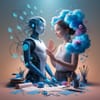As artificial intelligence continues to make inroads into the creative industries, one of the most intriguing questions is how AI will shape the future of storytelling. Writers, filmmakers, and artists have traditionally been the ones to craft narratives and create immersive worlds. However, with the rise of AI-powered tools, the line between human and machine-generated creativity is becoming increasingly blurred. This evolution presents both exciting opportunities and critical challenges for the future of creative work.
AI writing tools, like the ones that generate stories, articles, and even poetry, are becoming more sophisticated, capable of producing content that mirrors human expression. These systems are trained on vast datasets of text, learning patterns in language, tone, and structure to produce coherent narratives on demand. While some argue that AI can never replace the nuance, emotion, and complexity of human storytelling, others see AI as a valuable assistant in the creative process. Writers can use AI tools to generate ideas, draft content, or even explore different storylines quickly, opening up new possibilities for creative experimentation.
However, the rise of AI-generated content raises important ethical and philosophical questions about authorship and originality. If an AI system produces a story, who owns the intellectual property? Can a machine truly "create," or is it merely reassembling data in ways that mimic human creativity? These questions are critical as AI continues to push the boundaries of what we consider art and storytelling. Some believe that AI-generated stories are simply reflections of human input and imagination, while others fear that over-reliance on AI could undermine the unique voice of individual creators.
Despite these concerns, there are clear benefits to integrating AI into the creative process. For instance, AI can help overcome writer's block, provide inspiration for new ideas, and assist in editing or refining drafts. AI tools are particularly useful for creating large amounts of content quickly, which can be a game-changer for industries like marketing, media, and gaming, where content production is often time-sensitive. Moreover, AI can assist with tasks such as language translation, making creative works more accessible to global audiences and facilitating cross-cultural storytelling.
Looking ahead, the future of creativity and technology is likely to be one of collaboration rather than competition. AI will not replace human creativity but rather augment it, providing creators with new tools and techniques to enhance their craft. As AI continues to evolve, it will likely become an indispensable partner for storytellers, enabling them to break new ground in narrative creation. The real challenge will be ensuring that this partnership maintains a balance between human imagination and machine-generated innovation, ensuring that the heart and soul of creativity remain human-driven.


